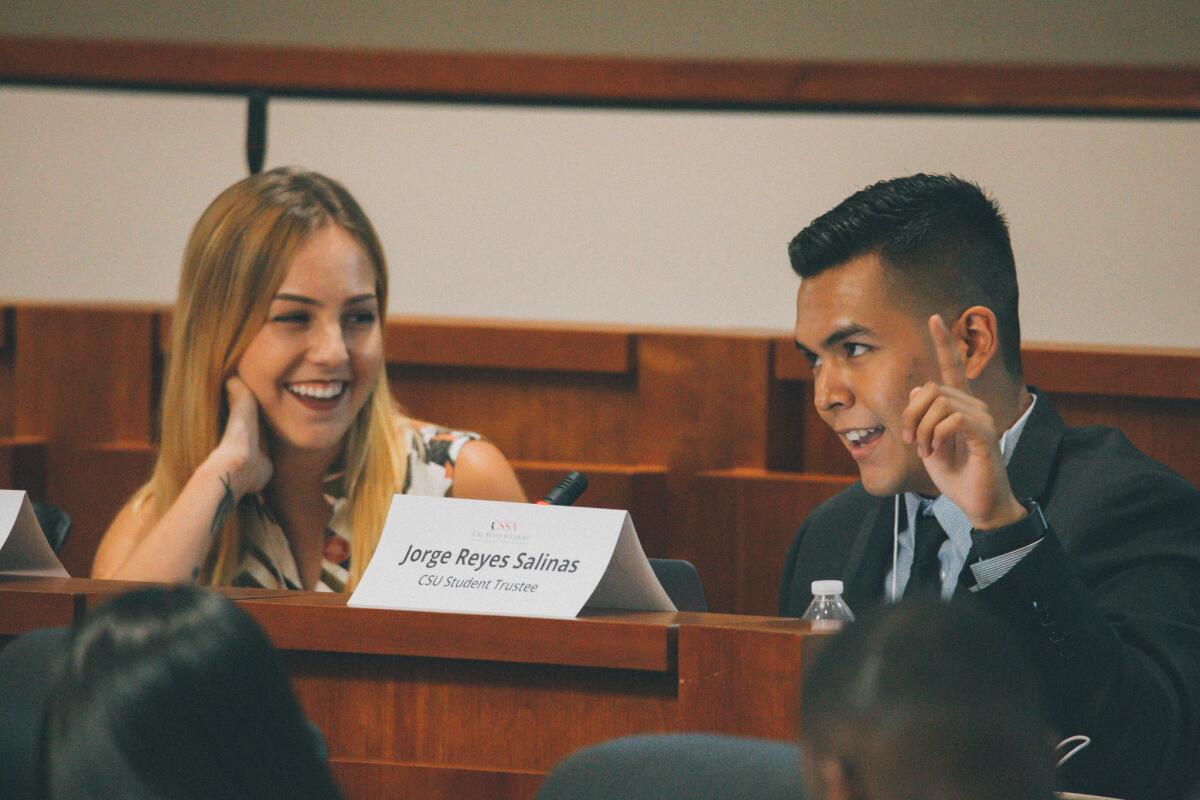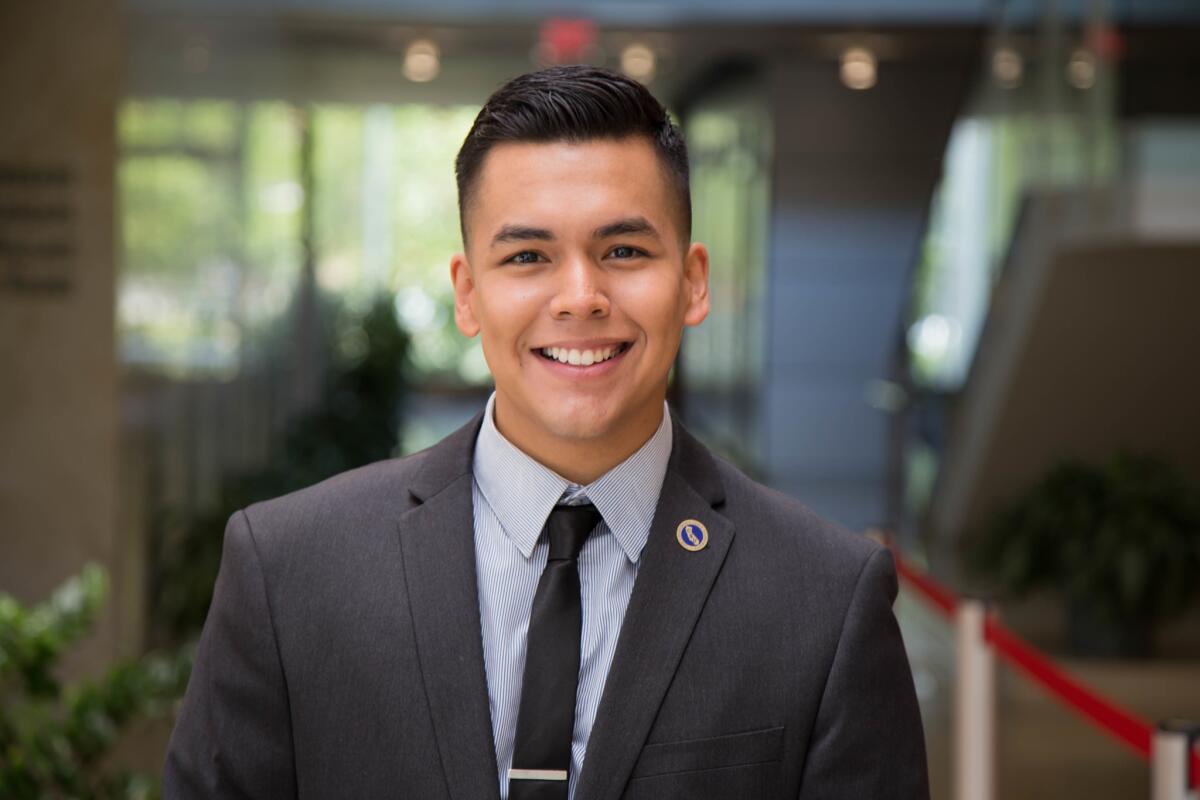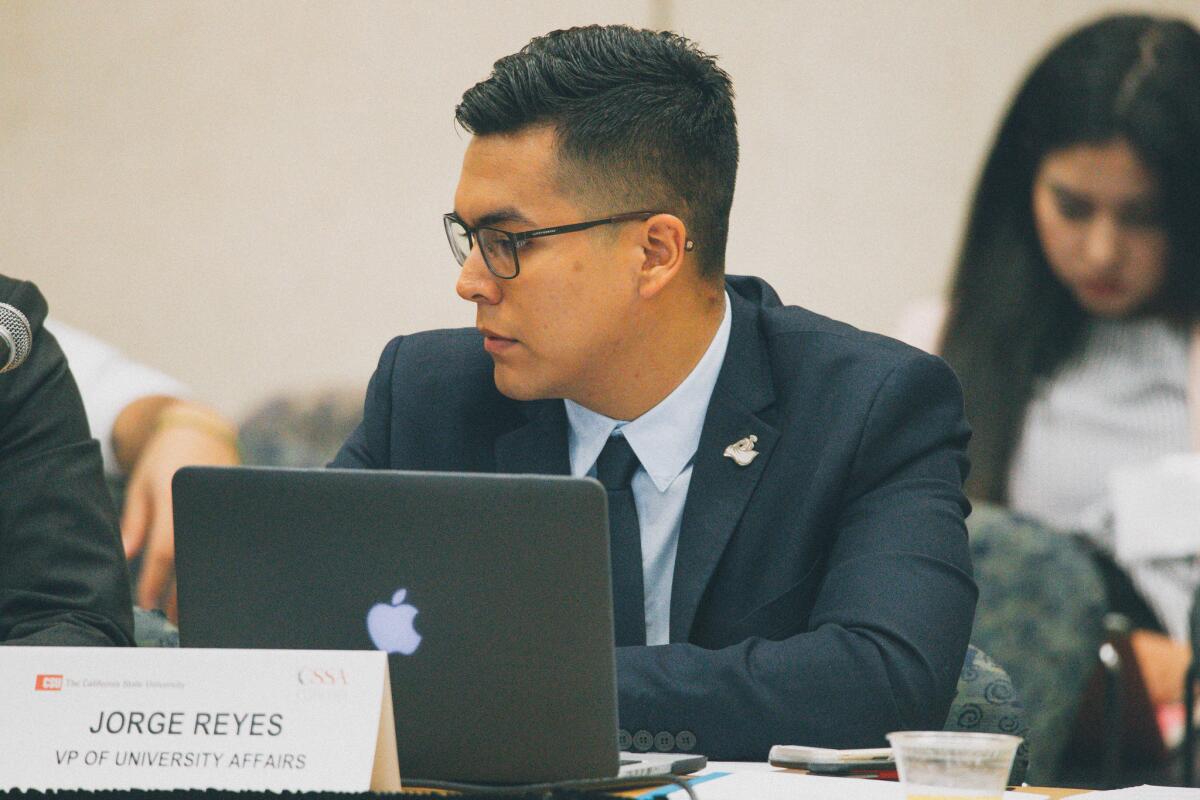Q&A: Campus conversation: Jorge Reyes Salinas, California State University student trustee
When Jorge Reyes Salinas was 10, his parents cobbled together enough money to leave Peru to start a new life in Los Angeles. They wanted a better future for their only son, who thought he was going to Disneyland.
Reyes Salinas didn’t understand what his lack of legal status meant until, as a sophomore in high school, he was encouraged to enroll in advanced classes at a local community college. The forms asked for a Social Security number, which he did not have.
State support made it possible for him to attend the one university he applied to:
In 2012, the
Now as the student appointee to the Cal State Board of Trustees, the 24-year-old meets with students at all 23 campuses and lobbies for them in Sacramento, often flying back just in time to make an afternoon class. He hopes to earn his master’s in communications studies in 2018. In his free time, he volunteers for the Make a Wish Foundation.
He took a moment this week to talk about DACA and other issues weighing on the nation’s largest public university system.
How do you feel about the current uncertainties regarding DACA? What are you hearing from fellow students?
It’s a lot of pressure … when it’s not only, “I’m going to school and trying to graduate,” but also, “I’m fighting for a country that I love so much to accept me.” When I think about it, every opportunity I’ve had has been about trying to prove … to this country that I do belong here, that I do want to contribute to society. I can’t speak for every student, but I know it’s that pressure of proving that I’m worth that investment.... Ever since I really understood my undocumented status, I’ve always been in fear for myself, for my family, for others like me.
A lot of students right now are thinking, “OK, DACA’s ending, should I still go to school? Should I still spend this much money to graduate or ... save that money for when things are really going to get rough? Or should I just go get a full-time job right now and save as much as I can before DACA ends?” … I really don’t want anyone to do that. I think education is the main way to continue our dreams and give back to the community. We need to keep pushing and remember why we’re here in the first place, why we’re getting our degrees.

You helped create Cal State Northridge’s Dream Center. Why is it important to share your own story and bring together those facing similar pressures?
It wasn’t until CSUN that I became more open about my status. I don’t think any of my high school friends know. It wasn’t something that I talked about, because you’re told not to mention anything, to avoid those questions, to follow the rules and stop at every stop sign.... But in this center, you’re allowed to say what’s going on. You’re allowed to say that you’re undocumented or you’re DACA or you have questions about a family member who has some immigration issues. You’re not hiding in the shadows.... People know about our community, but no one knows who we are. Sharing my story, other students were like, “Oh my God, I’m DACA too. How did you get into student government? How did you balance all of this while having all this pressure?” Opening myself up was what allowed other people to open up as well.
We need to keep pushing and remember why we’re here in the first place, why we’re getting our degrees.
— Jorge Reyes Salinas, Cal State student trustee

What are some issues that you’ve worked on that you felt really made a difference?
During my [student body] presidency, I started interning with Sen. [Bob] Hertzberg [D-Van Nuys].... My main project was working on transportation, working with Mayor [
They wanted students to come and speak at this open forum, but all the students had to take buses to get to the forum. I told them, “They’re not going to come, especially at 7 p.m. Our buses stop running at 9:30 p.m. This is not happening.” So I allocated money for us to fund Ubers for students who wanted to come to the forum to share their issues.
Read more at Essential Education, our daily look at education in California and beyond »
What other issues are you particularly passionate about?
Something that really keeps me up at night is access and affordability.... When I got into CSUN, I went from really happy to really disappointed, because my parents didn’t know how we were going to pay for it.... My story is not unique. There are many people — doesn’t matter their citizenship — they’re also sitting down with their parents and trying to figure out, “How are we going to afford this?” Representing 479,000 students in the CSU, I don’t just think about DACA students, I don’t just think about first-generation students, I think about all the students. I don’t benefit from some things that our students are getting, like federal grants, but I will still do anything to fight for them....
At the end of the day, I want to make sure that there’s access and affordability for everybody.... I hear stories of parents who have three kids and are getting their bachelor’s degrees, paying rent, working — all to give their families a better life. I think I have it rough, and then I hear these stories. It inspires me to keep fighting for them.... When I go lobby, I love sharing these super important stories that many of our senators and Assembly members don’t hear very often — because these students don’t have the time to advocate in Sacramento. I share their stories first before I think to share my own.

What do you hope to do after graduation?
I want to get a PhD. I’m not sure where exactly it will take me, but definitely fighting for access and affordability — whether working at a university level or an administration level or running for office or being more involved at the state level, being able to make sure that students have that chance at education to transform themselves, their communities, their class standing, going from working class to middle class and beyond.
I’m doing more research now on how high school students get educated for college. I’m reading about high schools that are not well funded, or students not testing the best that they can, or that they don’t have enough books or materials or teachers who are committing enough time. And ... other communities get all this funding and have this easier path to higher education. I think understanding all this is opening up a whole new area of passion for me....
My first high school shut down when I was a sophomore in high school because of funding. And when I got into a magnet school in Simi Valley, it was completely different. The academics were more rigorous, there was more testing, more college prep courses. There were career counselors, which I had never seen at my first high school. It was assumed that everyone’s next step was college.... It has done tremendous things for me, and I want to make sure that everyone gets that opportunity.
Follow @RosannaXia for more education news
Sign up for Essential California
The most important California stories and recommendations in your inbox every morning.
You may occasionally receive promotional content from the Los Angeles Times.








